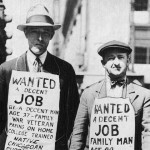Our first guest post! David Schell, a friend and fellow Huntington University alum, has granted me permission to reprint his post “Is Socialism Biblical?” I appreciate his generosity. I also appreciate his courage, since I intended to formulate a response (edit: click here to check out my response). If you are interested in publishing something here at The Pickled Pencil, email me at [email protected] and let’s talk about your ideas. I hope you enjoy this post!
A note about David: He earned his B.S. in Film Production in 2013. In 2013-14, he taught Language Arts at Panorama Middle School in Colorado Springs, CO. He is currently working on his M.Div at Pittsburgh Theological Seminary.
***
This morning, one of my wife’s friends sent her a link to a blog post condescendingly titled “Dear Liberal ‘Christians’: No, it’s Not ‘Christian’ for the Government To Redistribute My Money”. I call the title condescending because the word “Christian” is in scare quotes. Like a frightening number of other blog posts from all across American Christianity on both sides of the political spectrum, in the title alone, this post suggests that those who do not agree with the author are not Christians.
It’s tempting for me to join Ms. Kirchoff in saying that my political position is so much closer to what scripture teaches that those who don’t agree are so far wrong that they’re not even Christians. But what happens if I do that? I will insult my fellow Christians by refusing to give them the benefit of the doubt that their faith is sincere. There will be no chance made available for grace, and (if what I am saying is true) it will close them off to being guided into more truth and simply enrage them.
The post in question followed the tone in the title by being patronizing – including the utterly delicious phrase “In short, no. You’re wrong here too. Sucks, don’t it?” which, having admittedly typed similar sentences, I have no doubt felt utterly delicious. Then the author engages in name-calling, referring to a liberal Christian who might be reading her post in the second person as a “miserly crapweasel.”
She ends the post with this: “You’re just being an easily exploited rube with zero critical thinking skills. No, your Jesus fish will not absolve you of this one.” Now, unless this post is only for people who agree with her, she’s wasting her time here because if liberal Christians, as she says, have “zero critical thinking skills,” they won’t even be able to properly engage with her post and will just leave angry comments.
Ms. Kirchoff’s Argument
But what of the actual content of the post, tone aside? It’s mostly an argument from silence. The most biblical paragraph in the entire post is this one:
Jesus called his disciples to care for the least of these. The poor, the hungry, to clothe the naked, to visit prisoners, etc. This is Christianity 101. We all know it. As Christians we’re called to be Christ-like, to be his disciples, to preach his word. All good things. Put a giant check mark next to your Jesus fish.
So far so good. But what happens next is both surprising and not particularly biblical. It is essentially the libertarian argument that taxation is theft. Essentially the argument here (you can read it for yourself to verify my depiction) is that Jesus’ command “to care for the least of these” is for individuals and not for governments.
The central question, then, is whether Jesus wants the poor uplifted, the hungry fed, the naked clothed, and the prisoners visited, or whether he merely wants Christians to engage in these activities because they’re good things to do.
So would Jesus be happy with a government that spent its money (that is, its tax revenues) caring for the poor? Would God be happy with a government that redistributes unequal wealth to make sure that the poor aren’t poor?
I think engaging with scripture might get us further than an argument that “taxation is theft” – which is, perhaps, the first premise we should examine in the light of scripture. The better question, I think, might not be “Is taxation theft,” but…
Is Taxation Biblical?
Yes.
Unlike about 99% of other topics, the Bible is univocal regarding taxes: “Pay them.” The Bible does not speak to whether taxation is theft at all, which (I think) is why Ms. Kirchoff didn’t bring any scripture into her discussion. Here are a few examples of scripture’s position on taxation:
Romans 13:6-7
For the same reason you also pay taxes, for the authorities are God’s servants, busy with this very thing. Pay to all what is due them—taxes to whom taxes are due, revenue to whom revenue is due, respect to whom respect is due, honor to whom honor is due.
Mark 12:14-17 (paralleled in Matthew 22 and Luke 20)
And they came and said to him, “Teacher, we know that you are sincere, and show deference to no one; for you do not regard people with partiality, but teach the way of God in accordance with truth. Is it lawful to pay taxes to the emperor, or not? Should we pay them, or should we not?”
But knowing their hypocrisy, he said to them, “Why are you putting me to the test? Bring me a denarius and let me see it.” And they brought one. Then he said to them, “Whose head is this, and whose title?” They answered, “The emperor’s.” Jesus said to them, “Give to the emperor the things that are the emperor’s, and to God the things that are God’s.”
So the king summoned Jehoiada the chief, and said to him, “Why have you not required the Levites to bring in from Judah and Jerusalem the tax levied by Moses, the servant of the Lord, on the congregation of Israel for the tent of the covenant?”
In Nehemiah 5, a group of people complains that they have to borrow money to pay taxes, and Nehemiah doesn’t tell them not to worry about taxes, but rather condemns the charging of interest.
Furthermore, tax collectors are hated in the New Testament period, but Jesus eats with them.
You can read all the verses in the Bible with the word “tax” in them here.
In short, scripture does not speak to whether taxation is theft, only to whether Christians ought to pay. The answer to that question is a resounding “yes.”

Is Anything You Have Yours Anyway?
Now the whole group of those who believed were of one heart and soul, and no one claimed private ownership of any possessions, but everything they owned was held in common. (emphasis mine).
I can understand people who aren’t Christians being concerned about having their property and/or money taken and given to the poor, but I can’t see where Christians have any space to take issue with their money going to help the poor.
The Story of Zacchaeus
Luke 19:1-10 gives us a little snapshot of a government official – a chief tax collector – named Zacchaeus
who definitely redistributes wealth.
Zacchaeus stood there and said to the Lord, “Look, half of my possessions, Lord, I will give to the poor; and if I have defrauded anyone of anything, I will pay back four times as much.”
Then Jesus said to him, “Today salvation has come to this house, because he too is a son of Abraham. (Emphasis mine)
Now, I’m sure Ms. Kirchoff would be quick to point out that Zacchaeus was giving away his own money, not other people’s, but there’s one problem with this argument: Zacchaeus was a tax collector. “His money” was money that had been taken, in the form of taxes, from other people, with the threat of Roman soldiers – which speaks to Ms. Kirchoff’s argument in her parable in which an obscenely large portion of money goes to administrative fees. In Zacchaeus’ case, this portion is 50%.
A brief side note: The argument that private charity is always more efficient than government support is incorrect. The Center on Budget Policy and Priorities calculated that in the cases of SNAP, housing vouchers, school meals, SSI, and EITC, over 90% went directly to beneficiaries. Meanwhile, Samaritan’s Purse, which has a 4-star rating on CharityNavigator, spends only 88% on program expenses.
But how does Jesus respond to Zacchaeus’ promise to redistribute money that he took from other people to the poor? “Today salvation has come to this house.”

The Rich Ruler
A certain ruler asked him, “Good Teacher, what must I do to inherit eternal life?” 19 Jesus said to him, “Why do you call me good? No one is good but God alone. 20 You know the commandments: ‘You shall not commit adultery; You shall not murder; You shall not steal; You shall not bear false witness; Honor your father and mother.’” He replied, “I have kept all these since my youth.” When Jesus heard this, he said to him, “There is still one thing lacking. Sell all that you own and distribute the money to the poor, and you will have treasure in heaven; then come, follow me.”
When Jesus heard this, he said to him, “There is still one thing lacking. Sell all that you own and distribute the money to the poor, and you will have treasure in heaven; then come, follow me.”
Where did this ruler get his riches? This is just a guess, but I suspect he got his riches the same way all rulers for all time have gotten riches: taking them from other people.
But who are the rulers in the United States? In theory, it’s the voters. It’s us. Taxes, here, are not overwhelming compared to “Sell all that you own and distribute the money to the poor.” If anything, a 38% tax – with 100% given to the poor (not nearly the case in the United States) is not too far, but not nearly far enough.
Does the ruler obey Jesus? No. The ruler chooses to not obey Jesus. The ruler chooses not to follow Jesus. The ruler chooses to vote against having all (or any) of his money redistributed to the poor. So if we say that we are followers of Jesus, we probably shouldn’t complain about a portion of the taxes we are told to pay anyway going to help those in need.
The Testimony of the Older Testament
During biblical times, every family had land. It was inherited, passed down from generation to generation. That’s why Ahab trying to buy Naboth’s vineyard was such a big no-no. There were laws that said that even if a family was in terrible debt and they sold their land, in the year of Jubilee, the person who bought it had to give it back, at no cost to the original owner.
Isaiah 5:8 says this:
Ah, you who join house to house,
who add field to field,
until there is room for no one but you,
and you are left to live alone
in the midst of the land!
Isaiah 5:8 is a condemnation of wealthy landowners who buy up everyone else’s land so that they can be rich all by themselves and everyone else has to work for them. The people in this passage are condemned because they take the wealth that should rightly belong to everyone and collect it for themselves.
Furthermore, the Older Testament has laws about gleaning (see Ruth). Leviticus 19:9 says,”When you reap the harvest of your land, you shall not reap to the very edges of your field, or gather the gleanings of your harvest. You shall not strip your vineyard bare, or gather the fallen grapes of your vineyard; you shall leave them for the poor and the alien.”
But they planted the field! They worked the field! And now they’re supposed to give up a portion to the lazy people who didn’t do any work at all other than to just pick it up?
Caring for the Poor as the Early Church Did
The Roman Emperor Julian in 360 C.E. wrote in his Letter to Arsacius,
For it is disgraceful when no Jew is a beggar and the impious Galileans [the name given by Julian to Christians] support our poor in addition to their own; everyone is able to see that our coreligionists are in want of aid from us.
The early Christians did such a good job taking care of all the poor (not just the Christian poor) that it embarrassed the emperor. And these Christians were also paying taxes. The empire today (that is, the United States) is not embarrassed that Christians are taking better care of the poor while paying taxes; on the contrary, Christians are complaining that the government is using those taxes to do the job that our forefathers of the faith managed to do while still paying taxes!
If “we the people” are not the government, then we have the responsibility to pay taxes, but if “we the people” are the rulers, then we have the responsibility to distribute all of our money to the poor (not just 38%, which is only paid by the top tax bracket anyway, divided among military spending and other such things) and taxes are quite the bargain.
In short, scripture does not speak to whether taxation is theft, only to whether Christians should pay it (yes). Biblical justice involves redistributing wealth so that everyone has means of production (land).
Final Thoughts
I hope this post serves to demonstrate how and why some thinking Christians have come to a different conclusion, based on scripture and using reason and tradition, that is different from the conclusion that Christians who are politically conservative have come to.
We’re not the “easily exploited rubes” that my sister in Christ Ms. Kirchoff has depicted us as; we’re trying to follow Jesus too. And I hope if she or others who agree with her come to this post, they don’t feel unfairly insulted the way I did when I read her post.
I hope that I have written respectfully enough (and biblically enough) that, even if they would not agree with me, she and those who agree with her would be willing to consider my perspective and recognize that it is at least as biblically-based as hers.
And I would, of course, hope just a little bit that they would come to see things my way.













